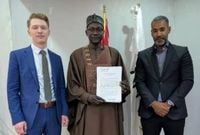Guinea-Bissau’s National Regulatory Authority for Information and Communication Technologies (ARN-TIC) has officially approved Starlink, Elon Musk’s satellite internet service, to operate in the country. The announcement was made by Bamba Kote, Chairman of the Board of Directors of ARN, during the opening ceremony of the 22nd General Assembly of the West African Telecommunications Regulators (WATRA), held in Bissau.
This milestone follows Starlink's initial provisional license granted in December 2024, and now with full regulatory approval in place, the company is set to complete its final administrative steps before launching full-scale operations in Guinea-Bissau.
Currently, about 67.5% of Guinea-Bissau's population lacks internet access, highlighting the urgent need for improved connectivity. The West African nation has traditionally relied on just two main providers, Orange and Telecel, which recently acquired MTN’s local operations. These companies primarily operate fiber connections through neighboring Senegal and Guinea-Conakry, supplemented by wireless transmissions. However, service disruptions are frequent and widespread, leaving many residents without reliable internet service.
Starlink's entry into Guinea-Bissau is part of a broader strategy to expand its footprint across Africa. The service has ramped up its activity this year, with Guinea-Bissau becoming the fifth country to approve Starlink in just the first four months of 2025. Earlier this month, Lesotho granted Starlink a 10-year operational license, following the imposition of a 50% tariff on exports to the United States, the highest rate imposed on any nation under former President Donald Trump’s now-paused reciprocal tariffs policy.
Since launching in Nigeria, Africa’s most populous country, in January 2023, Starlink has expanded to at least 18 African nations. Most recently, Somalia approved the service earlier this week, following similar approvals in Niger in March and Liberia in January.
The approval of Starlink in Guinea-Bissau is seen as a significant step towards enhancing digital inclusion and improving connectivity throughout the country. As Bamba Kote remarked during the announcement, this initiative aligns with ARN-TIC’s efforts to diversify and expand internet access, which is crucial for the nation’s development.
With the launch of Starlink, residents in Guinea-Bissau can look forward to increased access to the internet, which is expected to enhance educational opportunities, support local businesses, and improve access to information and services. The introduction of satellite internet is particularly important in a country where traditional internet infrastructure has struggled to keep pace with demand.
The potential impact of Starlink's operations in Guinea-Bissau could be transformative, especially for remote communities that have long been underserved by existing telecommunications providers. As the service becomes operational, it could bridge the digital divide and provide residents with the tools necessary to participate in the global economy.
Starlink's technology, which relies on a constellation of satellites orbiting the Earth, allows for internet access in areas where traditional broadband is either unavailable or unreliable. This innovative approach could prove particularly beneficial for Guinea-Bissau, where geographical challenges have historically hindered the expansion of internet services.
As the country prepares for the rollout of Starlink, there is cautious optimism among residents and officials alike. The hope is that this new service will not only provide faster and more reliable internet access but also stimulate economic growth and development in a nation that has faced numerous challenges in recent years.
In conclusion, the official approval of Starlink's operations in Guinea-Bissau marks a significant development in the country's telecommunications landscape. As the service moves towards full-scale operations, it represents an opportunity for increased connectivity and digital inclusion, addressing the needs of a population eager for access to the internet.





